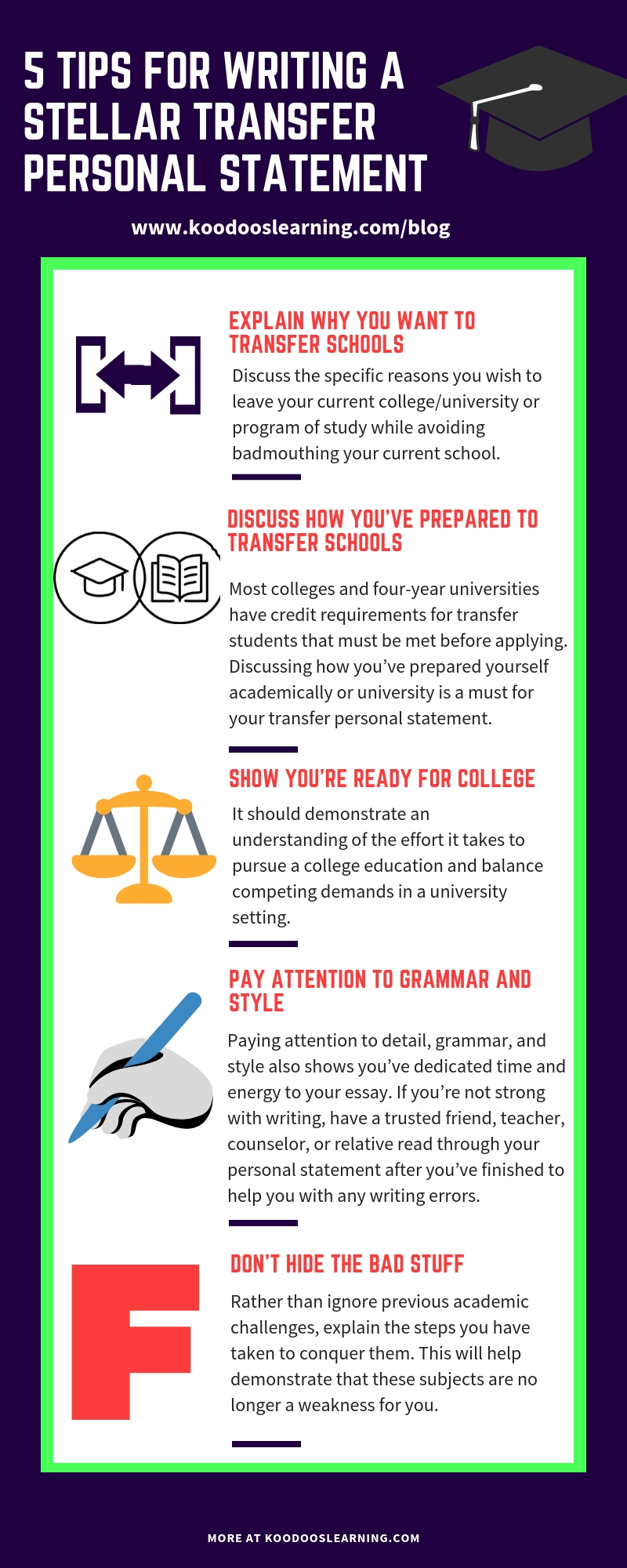5 Tips for Writing a Stellar Transfer Personal Statement
Whether you’re transferring from a community college or a four-year university, your transfer personal statement should be quite different than one written by a high school senior as a prospective freshman. Most essay prompts for transfer applications, in fact, don’t rely solely on the questions you’d normally find on the Common App or Coalition App system essay sections, but also explicitly ask applicants to write about their reason for wanting to transfer to their university. Transfer students SHOULD have a specific reason for leaving a school and admissions officers what to know what that reason is.
Transfer essays also tend to have a higher word limit than personal statements for freshmen applications. The University of Washington, for instance, requires transfer students to write an admissions essay that is between 750 and 1000 words, while their essay requirements for freshman applications include a main essay limited to 500 words and a short response limited to 300 words. Because of the extended word limit, transfer essays can provide more in-depth information about you, the applicant, than a personal statement from a freshman might. Still, I bet you’re wondering what should go into your transfer personal statement. Here’s what I recommend:
1. Explain why you want to transfer schools
As one important aspect of your essay, you should discuss the specific reasons you wish to leave your current college/university or program of study while avoiding badmouthing your current school. Focus on the advantages and positive aspects of the university you want to transfer to, instead of what you don’t like about where you currently are. List the specific academic reasons you want to transfer so that they are clearly articulated for the application reader. Again, your reasons for transferring should form the foundation of your entire essay, so don’t gloss over this part of your personal statement.
2. Discuss how you’ve prepared to transfer schools
Most colleges and four-year universities have credit requirements for transfer students that must be met before they can apply for admission or enroll. Still discussing how you’ve prepared yourself academically for a particular major, or university, in general, is a must for your transfer personal statement. Not only does it demonstrate that you’re prepared academically, but it also provides you with the space to explain your current academic interests, shows that you’ve taken advantage of your current academic opportunities, and demonstrates your devotion to learning.
3. Show you’re ready for college
Personal statements from transfer students should reflect the experience and maturity of someone who has already attended college because they have. It should also demonstrate an understanding of the effort it takes to pursue a college education and balance competing demands in a university setting. All these qualities will demonstrate that you can thrive in a high-pressure college environment.
4. Pay attention to grammar and style
Like with most college essays, your writing quality is an important part of “the score” you receive for your transfer personal statement as a part of your application. Paying attention to detail, grammar, and style also shows you’ve dedicated time and energy to your essay. If you’re not strong with writing, have a trusted friend, teacher, counselor, or relative read through your personal statement after you’ve finished to help you with any writing errors. I’m a die-hard fan of Grammarly and use it for all of my writing.
5. Don’t hide the bad stuff
If for any reason, you’ve had less than stellar grades, now is the time to take responsibility. Rather than ignore previous academic challenges, explain the steps you have taken to conquer them. If you had low grades in Algebra and Calculus in high school, for instance, you might discuss how you’ve since then taken Algebra II and Advanced Calculus and earned high marks. This will help demonstrate that these subjects are no longer a weakness for you.




















